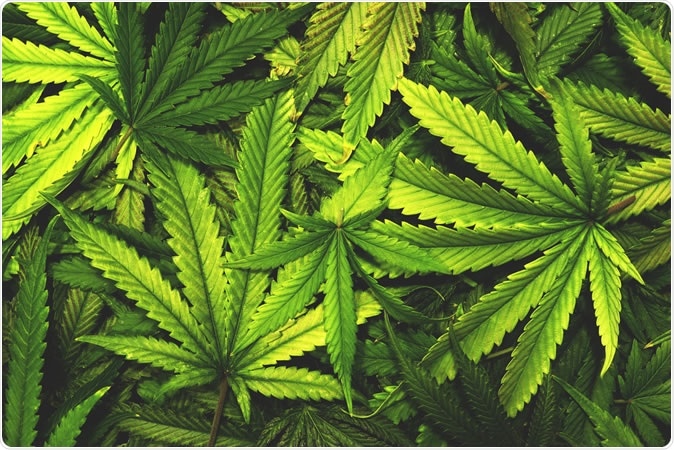A new study from Canada, published in the Journal of Psychopharmacology, suggests that many people with PTSD may be getting help with their condition from the use of cannabis. For the first time ever, this research documents how cannabis use is related both to PTSD and to mental health outcomes in the general population.
PTSD occurs when people come into direct and indirect contact with trauma. This could be in various forms, such as a sudden injury, war, struggles, calamities or violence. The affected individuals typically experience intrusive memories, flashbacks or nightmares, and are hyper-vigilant, besides having issues with insomnia. The result is an excessive rate of suicide, depression and substance abuse compared to the general population. In fact, about 9% of the Canadian population is affected by PTSD, which is among the highest rates globally.

Cannabis leaves. Image Credit: OpenRangeStock / Shutterstock
The study
The researchers collected data on over 24,000 Canadians from the 2012 Canadian Community Health Survey – Mental Health (CCHS-MH) database kept by Statistics Canada. This covers people aged 15 years and over. Their aim was to find out what effect cannabis use had on the management of post-traumatic stress disorder (PTSD). They took advantage of the fact that many PTSD sufferers already took cannabis since they had few other medical options to help them handle their symptoms.
The findings
The study found that 420 people reported a diagnosis of PTSD, which accounts for about 2% overall. Among them, 106 people (about 28%) had used cannabis once or more over the study period of one year. The corresponding figure for cannabis use in non-PTSD participants was 11%.
Individuals with PTSD who had used cannabis over the past year were less likely to have severe depression or to think of suicide than those who did not.
When the use of cannabis was compared between those with PTSD and non-PTSD individuals, non-users with PTSD had a seven-fold and almost five-fold increased risk of major depression and suicidal ideation respectively, compared to non-users who did not have PTSD. However, users with PTSD did not report either of these symptoms.
Earlier research
Another review published in September 2019 concluded that cannabinoids, the active compounds within cannabis, could help reduce nightmares and increase sleep quality in people with PTSD, but cautioned that more work was needed before their widespread adoption. These plant compounds appear to reshape memory processing by the brain, and this could be one mechanism underlying their usefulness. Their action on the endocannabinoid system also causes other aspects of brain activity to be more correctly regulated. Several other studies also echo the same warning: most current ‘evidence’ of cannabis efficacy in PTSD is of low quality or anecdotal. For instance, the reported positive effects of cannabinoids on sleep quality in PTSD do not consider the effects of these compounds on anxiety or depression, which often accompany PTSD. It is thus unclear whether cannabis affects primarily PTSD or these concomitant conditions. The pressing need is for properly designed trials to evaluate the clinical effects of the weed on this crippling condition so as to guide future therapeutic applications.
Researcher M-J Milloy says, “These findings are promising, and merit further study in order to fully understand the benefits of cannabis for people living with PTSD.”
Journal reference:
Does cannabis use modify the effect of post-traumatic stress disorder on severe depression and suicidal ideation? Evidence from a population-based cross-sectional study of Canadians. Stephanie Lake, Thomas Kerr, Jane Buxton, Zach Walsh, Brandon Marshall, Evan Wood, and M-J Milloy. Journal of Psychopharmacology (2019). https://doi.org/10.1177%2F0269881119882806. https://journals.sagepub.com/doi/abs/10.1177/0269881119882806